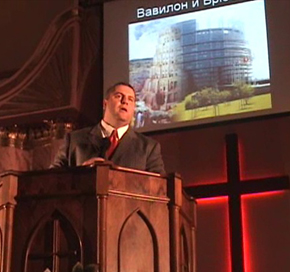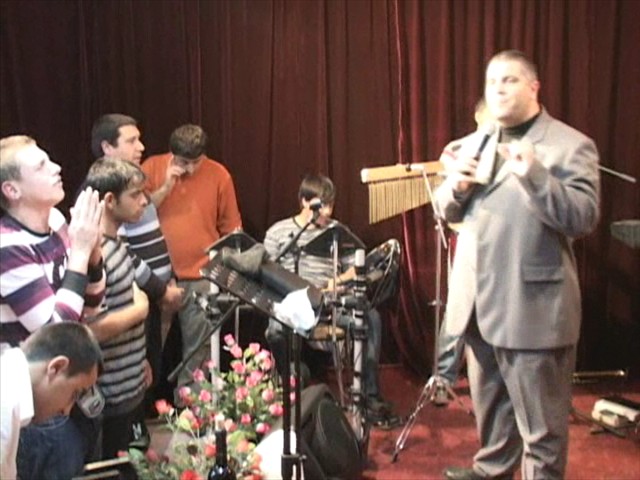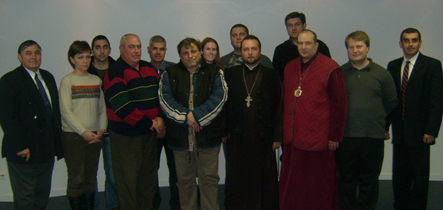Services at Samokov: Seeing through the Snowstorm
Comments Off on Services at Samokov: Seeing through the Snowstorm
We were blessed with a very long and warm fall season this year, which made our travels around the churches both possible and pleasant. Yet the first snowstorm inevitable hit and did so during the time when our team was scheduled to minister in the Samokov Church of God. The storm caught us while in Sofia preparing to host the biannual election meeting for the Bulgarian Chaplaincy Association. It was so severe that it left a larger part of the country without electricity. Regardless, we made our way through the curvy icy roads to the mountainous area of Samokov. As always, our travels were well worth it as we had one of the most anointed services in which the Lord led us to change what we were to deliver right after entering the church into His presence. Ministering along side of Church of God Overseer, Alexander Todorov, we prayed with the hundreds in attendance. After fellowship following the service our team left with a team from the Samokov church to minister in a near by Church of God for the evening service.
Thanksgiving in Kardjali, Bulgaria
During this Thanksgiving Holiday, our team received an invitation to organize and present a Day of the Bible event in six public schools in the city of Kardjali. Being the center of Bulgaria’s Muslim population, Kardjali and its surrounding region are often described as Bulgaria’s 10/40 window. The growing Muslim activities in the area are supported by over 150 new mosque builds in the past fifteen years alone. Naturally, Christian missions in the area are very limited and when a chance like this is presented, one does not hesitate to take it regardless of the cost.
After coordinating the event on the Day of the Bible with the local Church of God and the Assemblies of God pastors, we scheduled six presentations in the major public schools in town. Each presentation consisted of a brief lecture and a time for discussion. We were able to share with the students the story of the Bulgarian Bible, the translation and transition of the Bible text through the centuries and the role of the Bible in the postmodern technological stage through websites like our own Bibliata.com. Our team was also able to give out over 600 Bulgarian New Testaments and to donate Bibles and additional Christian literature to the schools’ libraries. This project was part of our Year of the Bible in Bulgaria and we give thanks for the God sent opportunity.
Bulgarian Chaplaincy Association Annual Meeting
The third national annual meeting of the Bulgarian Chaplaincy Association was held in the capital Sofia on November 22, 2008. Founding members and delegates from the country and abroad joined together to thank God for His help with the chaplaincy work in Bulgaria, elect new government and receive the 2009 strategy. The Bulgarian Church of God, Eastern Orthodox Church, Baptist Conference and Assemblies of God, as well as many ecumenical and non-denominational churches were represented at the meeting. New members were voted in after the general election session and were welcomed by the President of the European Evangelical Alliance, Dr. Nick Nedelchev. The delegates discussed the opportunities and difficulties for chaplaincy work in Bulgaria and emerging alerts in government relationships within the NATO context. Important leadership decisions concerning the involvement of the Association in the Chaplaincy master’s program offered by the newly accredited Bulgarian Theological University in Sofia were put in motion. Fifteen proposed projects were brought for deliberation in the afternoon session as the 2009 Strategy was voted in and project officers were appointed. It was further resolved that the Bulgarian Chaplaincy Association will be hosting the Balkan Chaplaincy Conference in 2009 and the new advanced chaplaincy training program with extensions in Sofia, Yambol and Varna.
Bibliata.TV Officially Launched
It is said that a picture is worth a thousand words and this is very much true for our new web-ministry project www.bibliata.tv – a GodTube like web interface which gives the opportunity for churches, ministers and individual believers to publish their Christian videos of worship, preaching, evangelizing, prayer, drama, movies and much more.
We envisioned the project as a ministry opportunity back in 2006 when the YouTube syndrome swept the world. The planning for the website took some time, but it was its actual technological implementation that set us back of schedule a few months. We began preparing the server machine for the project in February 2008 and it took us six months to set it up for testing which began in the month of September 2008. Our team pre-released the website in beta testing version on September 15, 2008 which is the beginning of the school year in Bulgaria. Unfortunately, three consecutive government halting procedures delayed its official release until the month of November, when we were able to obtain a new server machine under a contract with a new hosting company abroad.
Since its official launching in November 2008 Bibliata.TV has been populated with over 1000 Christian videos by over 200 registered users. The newly released website is already serving as an online Christian community for Bulgarian believers around the globe.
Requests for new video materials, sermons, lectures, church services and music videos have been requested from Bulgarian communities across Bulgaria as well as in Belgium, France, Canada, United States, Spain and Germany. Using Bibliata.TV, we were able to provide live coverage for the Days of Open Doors event organized by the Bulgarian evangelical churches in celebration of the Day of Reformation in Bulgaria. But talk is cheap and a picture is indeed worth a thousand words, especially when you see it for yourself at www.bibliata.tv.
National Leadership Seminar for the Bulgarian Church of God of Prophesy in Rousse
November 9th through the 11th our team held the Bible Leadership Seminar for the National Assembly of the Church of God of Prophecy in Rousse. Monday afternoon we gathered in the upper room of the church where there were some 50 leaders from the country were present. The pastor opened the seminar with prayer and song and we followed with the introduction of the course and then taught on the 21 Laws of Leadership from a Biblical Perspective. After a small break we introduced the module on Problem Solving, which was received very well by the audience and continued with a brief discussion.
Ministering at the Rousse Church of God of Prophecy
 This past Sunday we were privileged with the opportunity, for the first time, to minister in the Rousse Church of God of Prophecy. Rousse is in the northeastern part of Bulgaria on the right bank of the Danube river just minutes away from Romania. It is a very unique town with a rich history of more than 5000 years and vast ancient architecture. Many buildings still remain as they were hundreds of years ago. The church building itself is actually one of those buildings. Yet, the church is even more unique due to it being a former synagogue. The pastor told us the story of how, after many obstacles, the church family witness the miracle of being able to purchase the building and how they invested their various talents to restore the building.
This past Sunday we were privileged with the opportunity, for the first time, to minister in the Rousse Church of God of Prophecy. Rousse is in the northeastern part of Bulgaria on the right bank of the Danube river just minutes away from Romania. It is a very unique town with a rich history of more than 5000 years and vast ancient architecture. Many buildings still remain as they were hundreds of years ago. The church building itself is actually one of those buildings. Yet, the church is even more unique due to it being a former synagogue. The pastor told us the story of how, after many obstacles, the church family witness the miracle of being able to purchase the building and how they invested their various talents to restore the building.
During the Sunday morning service we shared on the signs of the last days for it is our belief that we are not just living in the last days, but in the last minutes. An alter call followed the message in which the entire church came to the front where we, along with the pastor and his wife, were able to pray for the people and their various needs.
In the afternoon we were asked to speak to the 30 some youth of the church who had gathered for a time of fellowship. They came with open minds and questions concerning the Bible. We were also able to share with them of the variety of Biblical resources which can be found on our website consortium, Bibliata.com. It was however much to our surprise that many of them already knew of such and had been adamantly using the site. It is always encouraging to learn that the time invested by our team to make Bibliata.com a reality has been appreciated and in this case it was by ones that we had never even met. We are thankful for this and for the very warm and inviting spirit of the church family in Rousse, Bulgaria.
80 Years Bulgarian Pentecostal Union
The Bulgarian Pentecostal Union is celebrating 80 years from its conception in 1928 when Bulgarian born missionary Dr. Nickolas Nikoloff, trained and ordained by the Assemblies of God denomination, arrived in Bourgas with a mission to organize the Pentecostal communities across the country into one denomination. The Bulgarian Pentecostal movement had begun almost a decade earlier, when Ukrainian immigrants to the United States, Voronaeff, Zaplishny and Koltovitch returning as missionaries to their motherland, preached the new message of Pentecost in Bulgaria. At the same time, a more conservative group split from the newly founded Union establishing an underground network of Spirit-baptized holiness churches, which were able to survive the persecutions of the Communist Regime (1944-1989) and is today commonly known as the Church of God in Bulgaria.
Members from the whole country were present for the celebration of the 80th anniversary of the Bulgarian Pentecostal Union which took place in the capital Sofia. Our team was able to represent the Bulgarian Church of God at the meeting. We were also given the opportunity to speak at the New Wave Youth Rally which took place that same afternoon and were able to present to the some one thousand young people who filled the whole auditorium, our new project Bibliata.TV. In addition on Sunday, we ministered at the Fire Church of God in Sofia lead by the Church of God Regional Overseer for the Sofia region, Pastor Daniel Kirov and at the Salvation Church of God, where we finished two of the modules of the National Leadership Seminar for the Church of God.
National Leadership Seminar for the Church of God Continues in Sofia
 We were again privileged to teach the next two levels of the National Leadership Seminar for the Church of God in Sofia. This is the of tenth leadership event we have held for the Church of God in Bulgaria since August, 2008. The two levels presented were the “21 Laws of Leadership” and “52 Leadership Principles of Jesus.” As we taught the topics in the Salvation Church of God in Sofia, we were all amazed by the fact how relevant and applicable Biblical leadership is in the Bulgarian context. The particular team we were working with that night, is a multicultural group of people that ministers both in Bulgaria and to Bulgarian immigrants in Europe. They have an extensive ongoing work with Bulgarian communities in Spain and Portugal. Just recently, they returned from a missions trip to Greece which we were also invited to join, but were unable to do so due to our full preaching schedule in Bulgaria. The night of the leadership course, the team was leaving on a ministry trip to England and Germany that same night. Yet, they were eager to sit around the drawing board with us, learn new leadership principles and draft new strategies for ministry to implement in their trip. While many claim that the times of revival in Bulgaria re long gone, we were again amazed by the enthusiasm and motivation of the ministry teams in Sofia. And it seemed clear that true revival comes not from the crowds that it draws, but from the internal God-given motivation of people that are willing to dedicate their whole lives for bringing true spiritual revival to the land. For revival must go on …
We were again privileged to teach the next two levels of the National Leadership Seminar for the Church of God in Sofia. This is the of tenth leadership event we have held for the Church of God in Bulgaria since August, 2008. The two levels presented were the “21 Laws of Leadership” and “52 Leadership Principles of Jesus.” As we taught the topics in the Salvation Church of God in Sofia, we were all amazed by the fact how relevant and applicable Biblical leadership is in the Bulgarian context. The particular team we were working with that night, is a multicultural group of people that ministers both in Bulgaria and to Bulgarian immigrants in Europe. They have an extensive ongoing work with Bulgarian communities in Spain and Portugal. Just recently, they returned from a missions trip to Greece which we were also invited to join, but were unable to do so due to our full preaching schedule in Bulgaria. The night of the leadership course, the team was leaving on a ministry trip to England and Germany that same night. Yet, they were eager to sit around the drawing board with us, learn new leadership principles and draft new strategies for ministry to implement in their trip. While many claim that the times of revival in Bulgaria re long gone, we were again amazed by the enthusiasm and motivation of the ministry teams in Sofia. And it seemed clear that true revival comes not from the crowds that it draws, but from the internal God-given motivation of people that are willing to dedicate their whole lives for bringing true spiritual revival to the land. For revival must go on …
Days of Open Doors Press Conference in Varna
 When the year 2008 was announced as the Year of the Bible in Bulgaria, it drew many churches and organizations in a common attempt to present a unified evangelical strategy. Accordingly, many of the opponents of the evangelical movement in Bulgaria used this as an opportunity to attack the evangelical churches calling them “sectarians” and “heretics.” The attention which the general media gave to this anti-evangelical wave in the media reminded of a similar wave which took place in the early 1990s in Bulgaria. This time, however, the evangelical churches were prepared and ready to resist these unacceptable media attacks which restrict religious freedom and oppose the pluralistic values of the democratic society. In a typical puritan matter, a number of evangelical churches have organized acts of peaceful protest and media events to counteract the false accusations and establish anew the truth about Bulgarian evangelism.
When the year 2008 was announced as the Year of the Bible in Bulgaria, it drew many churches and organizations in a common attempt to present a unified evangelical strategy. Accordingly, many of the opponents of the evangelical movement in Bulgaria used this as an opportunity to attack the evangelical churches calling them “sectarians” and “heretics.” The attention which the general media gave to this anti-evangelical wave in the media reminded of a similar wave which took place in the early 1990s in Bulgaria. This time, however, the evangelical churches were prepared and ready to resist these unacceptable media attacks which restrict religious freedom and oppose the pluralistic values of the democratic society. In a typical puritan matter, a number of evangelical churches have organized acts of peaceful protest and media events to counteract the false accusations and establish anew the truth about Bulgarian evangelism.
One of these acts was the Days of Open Doors organized by the evangelical churches in the Black Sea port city of Varna on the Day of Reformation. Our team was also invited to participate as cofounder of the Institute for Bulgarian Protestant History. One of the many events which took place during the Days of Open Doors was a press conference which was given in the Varna Press Center. Side by side with the Assemblies of God and the Methodist churches, we were able to represent our Church of God denomination in partnership with the Institute for Bulgarian Protestant History in a powerful media event, which put a start to a national PR campaign on behalf of the evangelical churches in Bulgaria. Similar campaigns took place in Sofia, Bourgas, Lovetch and just recently in Silistra on the Danube river. We were also able to publish a commemorative brochure dedicated to the important role of Protestants in the Bulgarian national history.
Revision of the 1940 Bulgarian Bible Published
 Twelve full years have now passed from the day we published the first Bulgarian online Bible in the fall of 1996. The text which we then used for the task was a computerized version of the 1940 revision of the Bulgarian Bible. Since that time, this text has become a classic Bible study tool for everyone who uses a computer to study the Bulgarian Bible. Many websites, including our own Bibliata.com, have included the text as a Bulgarian standard reference and the Bible Works software has published it in its last several versions. Many of the Bulgarian Bible publishers have used it as a base for their new revision and the Gideon’s have helped distribute it to every corner of the country.
Twelve full years have now passed from the day we published the first Bulgarian online Bible in the fall of 1996. The text which we then used for the task was a computerized version of the 1940 revision of the Bulgarian Bible. Since that time, this text has become a classic Bible study tool for everyone who uses a computer to study the Bulgarian Bible. Many websites, including our own Bibliata.com, have included the text as a Bulgarian standard reference and the Bible Works software has published it in its last several versions. Many of the Bulgarian Bible publishers have used it as a base for their new revision and the Gideon’s have helped distribute it to every corner of the country.
This year our team was able to publish, on paper, the 1940 Revision of the Bulgarian Bible with the help from our colleagues from Bibles.org.uk. This new edition contains 800 pages in a beautiful hard cover and can be purchased directly from the publisher at Lulu.com. It has become one of our projects in the Year of the Bible in Bulgaria and we are hoping to be able to put this version in a set with the 1871 Constantinople Bible by the end of the year.








